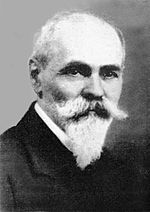Stanisław Zaremba (3 October 1863 – 23 November 1942) was a Polish mathematician and engineer.[1] His research in partial differential equations, applied mathematics and classical analysis, particularly on harmonic functions, gained him a wide recognition. He was one of the mathematicians who contributed to the success of the Polish School of Mathematics through his teaching and organizational skills as well as through his research. Apart from his research works, Zaremba wrote many university textbooks and monographies.
Stanisław Zaremba | |
|---|---|
 Stanisław Zaremba | |
| Born | 3 October 1863 |
| Died | 23 November 1942 (aged 79) |
| Nationality | Polish |
| Alma mater | University of Paris |
| Known for | Mathematical analysis Direct method in the calculus of variations Potential theory Mixed boundary condition Zaremba-Jaumann rate of the Cauchy stress Reproducing kernel Hilbert space |
| Scientific career | |
| Fields | Mathematical analysis |
| Institutions | Jagiellonian University |
| Doctoral advisor | Jean Gaston Darboux Charles Émile Picard |
| Doctoral students | Stanisław Gołąb Wacław Sierpiński Włodzimierz Stożek Tadeusz Ważewski |
He was a professor of the Jagiellonian University (since 1900), member of Academy of Learning (since 1903), co-founder and president of the Polish Mathematical Society (1919), and the first editor of the Annales de la Société Polonaise de Mathématique.
He should not be confused with his son Stanisław Krystyn Zaremba, also a mathematician.
Biography
editZaremba was born on 3 October 1863 in Romanówka, present-day Ukraine. The son of an engineer,[1] he was educated at a grammar school in Saint Petersburg and studied at the Institute of Technology of the same city obtaining is diploma in engineering in 1886.[1] The same year he left Saint Petersburg and went to Paris to study mathematics: he received his degree from the Sorbonne in 1889.[1] He stayed in France until 1900, when he joined the faculty at the Jagiellonian University in Kraków. His years in France enabled him to establish a strong bridge between Polish mathematicians and those in France.
He died on 23 November 1942 in Kraków, during the German occupation of Poland.
Work
editResearch activity
editZaremba's magneficent discoveries found a broad response and deep appreciation in the world. Stanisław Zaremba is the pride of Polish science. At the same time, by his pioneering activity in such an important field as mathematical analysis, he became one of the creators of modern Polish mathematics.
— Kazimierz Kuratowski, (Kuratowski 1980, p. 183).
Selected publication
edit- — (1907). Zarys pierwszych zasad teoryi liczb całkowitych (in Polish). Kraków: Akademia Umiejętności. OCLC 69628334.
- — (1909). Pogląd na historyę rozwoju i stan obecny teoryi równań fizyki w czterech odczytach (in Polish). Warsaw: Druk. J. Sikorskiego. OCLC 69346520.
- — (1909). Teorya wyznaczników i równań liniowych (in Polish). Kraków: Kółko Matematyczno-Fizyczne Uczniów Uniwersytetu Jagiellońskiego. OCLC 69616537.
- — (1909), "Sur l'unicité de la solution du problème de Dirichlet", Bulletin International de l'Académie des Sciences de Cracovie. Classe des Sciences Mathématiques et Naturelles, Serie A: Sciences mathématiques (in French): 561–563, JFM 40.0452.02
- — (1910), "Sur un problème mixte relatif à l' équation de Laplace", Bulletin International de l'Académie des Sciences de Cracovie. Classe des Sciences Mathématiques et Naturelles, Serie A: Sciences mathématiques (in French): 313–344, JFM 41.0854.12, translated in Russian as Zaremba, S. (1946), Об одной смешанной задаче, относящейся к уравнению Лапласа, Uspekhi Matematicheskikh Nauk (in Russian), 1 (3–4(13–14)): 125–146, MR 0025032, Zbl 0061.23010.
- — (1912). Arytmetyka teoretyczna (in Polish). Kraków: Akademia Umiejętności. OCLC 69511091.
- — (1914). Ogólne zasady analizy matematycznej. Cz. 2: Rachunek całkowy (in Polish). Kraków: Kółko Matematyczno-Fizyczne Uczniów Uniwersytetu Jagiellońskiego.
- — (1915). Wstęp do analizy. Cz. 1: Pojęcie dowodu matematycznego oraz inne wiadomości pomocnicze (in Polish). Warsaw: skł. gł. w Księgarni Gebethnera i Wolffa. OCLC 69586726.
- — (1918). Wstęp do analizy. Cz. 2: Teorya liczb rzeczywistych (in Polish). Warsaw: skł. gł. w Księgarni Gebethnera i Wolffa. OCLC 69586727.
- — (1933). Zarys mechaniki teoretycznej. Tom 1: Wiadomości pomocnicze i kinematyka (in Polish). Kraków: Akademia Umiejętności. OCLC 69538136.
See also
editNotes
edit- ^ a b c d (Kuratowski 1980, p. 180).
References
edit- "Zaremba Stanisław". Internetowa encyklopedia PWN (in Polish). Wydawnictwo Naukowe PWN. Retrieved 2007-11-26..
- "Zaremba Stanisław". WIEM Encyklopedia (in Polish). Retrieved 2007-11-26..
- Koroński, Jan (2016), "Stanisław Zaremba (1863‒1942) and his results in the field of differential equations", Technical Transactions, 2016 (Fundamental Sciences Issue 2-NP (20) 2015), doi:10.4467/2353737XCT.15.217.4422 (inactive 1 November 2024)
{{citation}}: CS1 maint: DOI inactive as of November 2024 (link). - Kuratowski, Kazimierz (1980), A Half Century of Polish Mathematics: Remembrances and Reflections, International Series in Pure and Applied Mathematics, vol. 108, Warsaw / Oxford: Wydawnictwo Naukowe PWN / Pergamon Press, pp. VIII+204, ISBN 83-01-00819-9, MR 0565253, Zbl 0438.01006, ISBN 0-08-023046-6.
External links
edit- O'Connor, John J.; Robertson, Edmund F., "Stanisław Zaremba (mathematician)", MacTutor History of Mathematics Archive, University of St Andrews
- Stanisław Zaremba at the Mathematics Genealogy Project